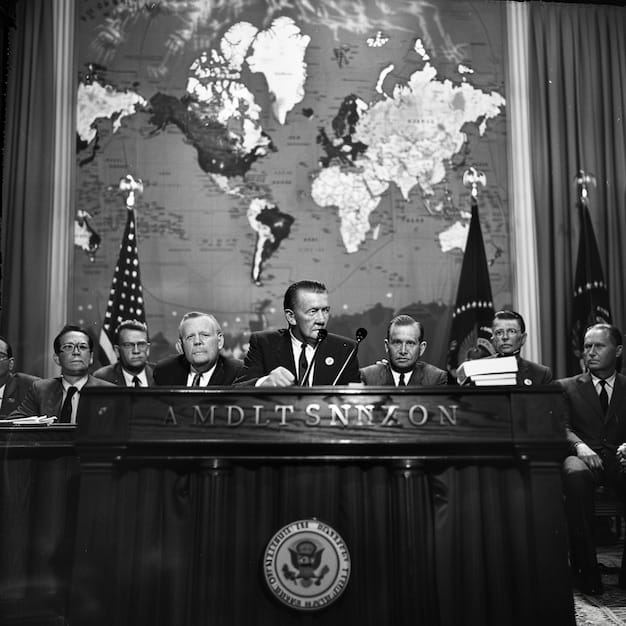US Role in International Organizations: Cooperation and Challenges

The US role in international organizations is pivotal for promoting global cooperation and addressing shared challenges such as security, economic stability, and humanitarian crises.
The US role in international organizations has been a cornerstone of global cooperation for decades. Understanding this role is crucial to navigating today’s complex world. Let’s explore how the U.S. contributes to and shapes these organizations.
The Historical Context of US Involvement
The United States has played a significant role in the formation and evolution of international organizations since the early 20th century. Understanding this history provides a foundation for appreciating the current dynamics.
Post-World War II Leadership
Following World War II, the U.S. emerged as a global superpower and took on a leadership role in establishing key international institutions.
This involved active participation in shaping the mandates and structures of organizations like the United Nations.
- United Nations (UN): The United States was instrumental in the UN’s founding in 1945, aiming to prevent future global conflicts.
- World Bank and International Monetary Fund (IMF): These institutions were created to stabilize the global economy and promote economic development, with significant influence from the U.S.
- NATO: Established in 1949, the North Atlantic Treaty Organization was a US-led military alliance to counter Soviet expansion during the Cold War.
These early engagements set the stage for continued US involvement, albeit with evolving priorities.

Promoting Global Security
One of the core functions of international organizations is to maintain global peace and security. The U.S. plays a critical role in these efforts.
Peacekeeping and Conflict Resolution
The U.S. contributes significantly to peacekeeping operations and conflict resolution efforts through various international bodies.
This includes both financial support and direct involvement in diplomatic initiatives.
- UN Peacekeeping Missions: The U.S. provides substantial financial contributions to UN peacekeeping efforts around the world.
- NATO Operations: The U.S. military plays a leading role in NATO’s peacekeeping and crisis management operations, such as those in the Balkans and Afghanistan.
- Diplomatic Engagements: The U.S. engages in bilateral and multilateral diplomacy to mediate conflicts and promote peaceful resolutions.
These actions reflect the U.S.’s commitment to international stability, although the nature and extent of involvement can vary depending on the specific context.
Economic Cooperation and Trade
International organizations facilitate economic cooperation and trade, which are essential for global prosperity. The United States is a key player in these arenas.
Influence on Global Economic Policies
The U.S. exerts considerable influence on global economic policies through its participation in institutions like the IMF and the World Trade Organization (WTO).
This influence is used to promote free trade, financial stability, and sustainable development.
- International Monetary Fund (IMF): The U.S. has significant voting power within the IMF, influencing its lending policies and crisis management strategies.
- World Trade Organization (WTO): The U.S. advocates for the reduction of trade barriers and the enforcement of international trade agreements through the WTO.
- G7 and G20: The U.S. participates in these forums to coordinate economic policies with other major economies.
The US aims to foster a stable and open global economy, although its policies often reflect its own economic interests as well.

Addressing Humanitarian and Health Crises
Global humanitarian and health crises require coordinated international responses. The U.S. is a major contributor to these efforts.
Support for Global Health Initiatives
The U.S. provides substantial financial and technical support for global health initiatives through organizations like the World Health Organization (WHO) and UNICEF.
This support is crucial for combating infectious diseases, improving maternal and child health, and strengthening health systems in developing countries.
- World Health Organization (WHO): The U.S. has historically been a major funder of the WHO, although its relationship has seen fluctuations in recent years.
- UNICEF: The U.S. supports UNICEF’s efforts to provide humanitarian assistance to children and mothers in need.
- USAID: The U.S. Agency for International Development (USAID) implements various health programs around the world.
The U.S.’s engagement in global health reflects its commitment to addressing humanitarian needs and promoting global health security.
Challenges and Criticisms of US Involvement
While the US role in international organizations is often seen as positive, it also faces challenges and criticisms.
Concerns About Sovereignty and Influence
Some critics argue that U.S. involvement in international organizations can undermine national sovereignty and lead to the imposition of U.S. values and policies on other countries.
There are also concerns about the disproportionate influence of the U.S. in these organizations.
These debates highlight the complexities of balancing national interests with global responsibilities.
The Future of US Engagement
The future of US engagement in international organizations is uncertain, given changing geopolitical dynamics and domestic political considerations.
Potential Scenarios and Policy Options
Several potential scenarios could shape the future of the US role in international organizations. These range from continued leadership to selective disengagement.
Policy options include strengthening multilateral partnerships, focusing on specific issue areas, and pursuing alternative forms of international cooperation.
| Key Point | Brief Description |
|---|---|
| 🌍 Global Security | US contributes to peacekeeping and conflict resolution efforts. |
| 📈 Economic Policies | Influence on IMF and WTO to promote free trade and stability. |
| ❤️ Humanitarian Crises | Support for WHO and UNICEF to address health and aid crises. |
| ⚖️ Challenges | Concerns about sovereignty and disproportionate influence. |
FAQ
▼
The US plays a significant role in the UN through financial contributions, participation in peacekeeping missions, and diplomatic engagement, shaping the UN’s agenda and policies.
▼
The US has substantial voting power in the IMF, which allows it to influence the IMF’s lending policies, economic surveillance, and crisis management strategies.
▼
The US is a leading member of NATO, providing military and financial support. It plays a key role in NATO’s defense planning, operations, and strategic decision-making.
▼
Some critics argue that the US has disproportionate influence, which can undermine national sovereignty and lead to the imposition of US values and policies on other countries.
▼
Future US engagement could range from continued leadership to selective disengagement, shaped by geopolitical dynamics and domestic politics. Policy options include strengthening multilateral partnerships.
Conclusion
The US role in international organizations is multifaceted and has evolved over time. The actions taken by the nation in these organizations help to shape international politics, economics, and security.





